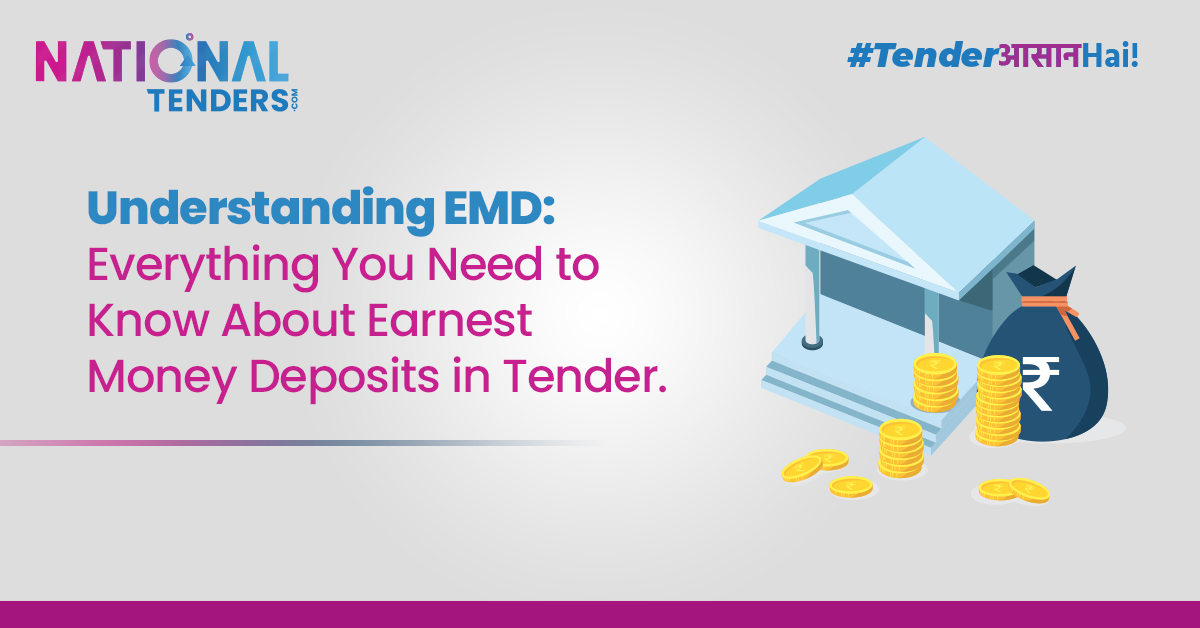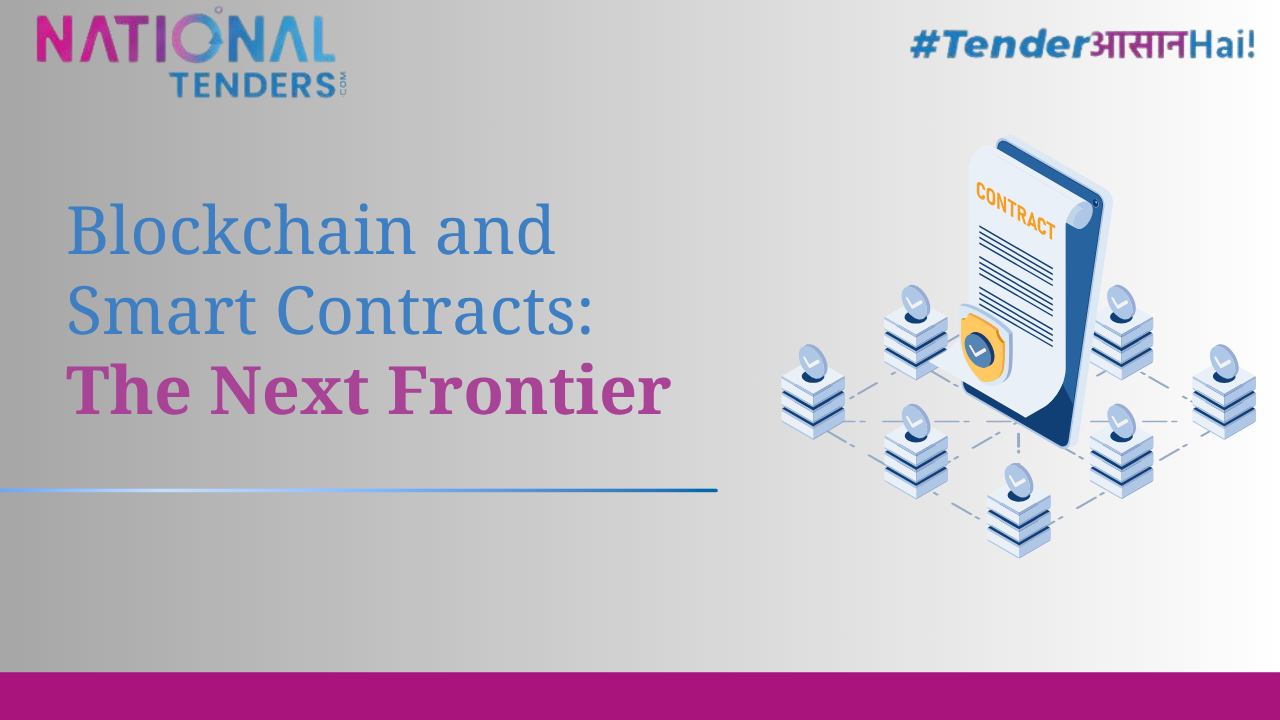- Home
- >
- Blog
OUR BLOG
A collection of stories about our people, our capabilities, our research, and the ever-changing face of our firm.

NationalTenders
Understanding EMD: Everything You Need to Know About Earnest Money Deposits in Tender | 14 Jun, 2023
Understanding EMD: Everything You Need to Know About Earnest Money Deposits in Tender
Earnest money deposit (EMD) is a well-known term in the tender industry. Earnest money is a deposit made by the bidder with the procurement document to show their genuine interest in the procurement and their readiness to take up the project in case they enter into a contract. The EMD is usually calculated as a percentage of the total tender value, and it serves the purpose of verifying that only serious bidders participate in the procurement process. EMD is a crucial aspect of the procurement process, as it not only proves the validity of the bidder but also helps the issuer of the procurement to weed out the non-serious bidders. In case the bidder fails to secure the agreement, the EMD is forfeited. However, if the bidder is successful in securing the contract, the EMD is adjusted against their security deposit or performance guarantee. Overall, EMD serves as a relevant component of procurement, ensuring fair and transparent tender bidding.
Is earnest money deposit mandatory in procurement?
Yes, an earnest money deposit is often required in a procurement process. An earnest money deposit is a monetary deposit or assurance submitted directly to the seller by a bidder or contractor as a demonstration of their serious intent and commitment to fulfilling the terms and conditions of the contract. It helps ensure that bidders are genuine and have the financial capacity to undertake the project if they are awarded the agreement. The deposit is usually a percentage of the total procurement value and is refundable if the bidder does not win the contract or is sometimes applied towards the agreement price if they are successful. The specific requirements regarding earnest money deposits can vary depending on the procuring organization and the nature of the project.
Is EMD payment refundable?
EMD or Earnest Money Deposit is a monetary deposit that is made by bidders while participating in govt tenders. It is a security deposit that ensures the bidders' commitment to the contract, and it also establishes their financial capability. EMD is a mandatory requirement for most govt tenders in India. But the question arises, is EMD payment refundable in tenders? The answer is yes. EMD money is refunded to them on fulfilling certain conditions. If the vendors do not violate any terms and conditions and withdraw their bids before the deadline, they get the money back. However, if the bidder is awarded the contract but fails to complete the deal, the EMD becomes non-refundable. The refund process is carried out by the vendor or government agencies once the tender is closed and the contract is given to the successful bidder. In conclusion, EMD payment is refunded in tenders, but only if the vendor fulfills the specified conditions.
How EMD amount differs from the security deposit?
EMD or earnest money deposit is a fixed amount of money that is deposited by a bidder as a pledge of his or her intentions to complete the contract as committed. EMD differs from the security deposit in procurement as it is a fund that acts as an assurance for the buyer, showing the seriousness of the tender bidding party in purchasing the product or service. The purpose of EMD is to reduce the risk of non-serious bidders in e-procurement. EMD is usually calculated as a percentage of the value of the proposed purchase or estimated cost of works. In contrast, a security deposit is a fund that is used to ensure the buyer receives compensation, should the seller fail to fulfill their obligations. In conclusion, EMD is a financial tool used in e-procurement that helps prove the seriousness of its bidders, while the assurance deposit is used to assure the buyer that the seller will live up to their commitments.
Which businesses are exempted from EMD payment by the government?
According to Rule 170 of General Financial Rules (GFRs) 2017, Micro, Small & Medium Enterprises (MSMEs) are exempted from submitting an earnest money deposit (EMD) as bid security while participating in government procurements. This initiative is considered to be a step towards promoting the growth and development of these businesses. The move aims to cater to the financial constraints faced by MSMEs, which often lack the necessary resources to participate in procurements and are either unable or unwilling to furnish EMDs. The exemption of earnest money deposits for MSMEs is justified considering that these businesses contribute tremendously to the economy, generate employment, and facilitate equitable distribution of wealth. However, it is crucial to note that not all businesses may be exempted from EMD, and this rule only applies to MSMEs as per the GFRs 2017. Therefore, it is essential for businesses to be aware of their eligibility for exemption and adhere to the guidelines provided by the government while participating in procurements.
How is the EMD amount calculated?
EMD or Earnest Money Deposit is a sum of money paid by a bidder or buyer during the procurement to show their intention and seriousness to complete the transaction. The EMD amount differs from one procurement to another, and it is usually decided based on a fixed percentage of the quoted price of the product or service being procured. Generally, the EMD amount ranges from 2% to 5% of the total sale price or purchase price. For instance, if the total sale price is Rs.10,00,000, then the EMD amount can be between Rs. 20,000 to 50,000. The money deposited as EMD is kept in a separate fund, which is used to reimburse the bidders who are not awarded the contract. Upon successful completion of the transaction, the amount received as EMD is usually returned to the bidder along with the contract award. However, if the bidder withdraws from the procurement process or breaches any agreement terms, their EMD amount may be forfeited and added to the fund. The payment of EMD is typically done through bank transfer for security and transparency purposes.
National Tenders - Your Expert Gateway to Winning Government Tenders
National Tenders stands as an invaluable online portal that provides expert assistance to bidders seeking government tenders. With its vast knowledge and experience in the procurement industry, National Tenders aids bidders in navigating the complex tendering process, ensuring their participation is well-informed and competitive. By leveraging the platform's resources and expertise, bidders can enhance their chances of securing lucrative government contracts and contributing to the nation's growth and development. With National Tenders by their side, bidders can confidently pursue government tenders, knowing they have the support and guidance needed to succeed in this highly competitive landscape.
 How E-Tendering is Transforming the Tender System in India
How E-Tendering is Transforming the Tender System in India Building Strong Vendor Partnerships in the Tender Ecosystem
Building Strong Vendor Partnerships in the Tender Ecosystem Unlocking Big Savings Through Smart Tender Strategies
Unlocking Big Savings Through Smart Tender Strategies How Generative AI Is Disrupting Tendering in 2025
How Generative AI Is Disrupting Tendering in 2025 Blockchain and Smart Contracts: The Next Frontier in Public Procurement
Blockchain and Smart Contracts: The Next Frontier in Public Procurement
SUBSCRIBE NOW
Kindly fill up the form